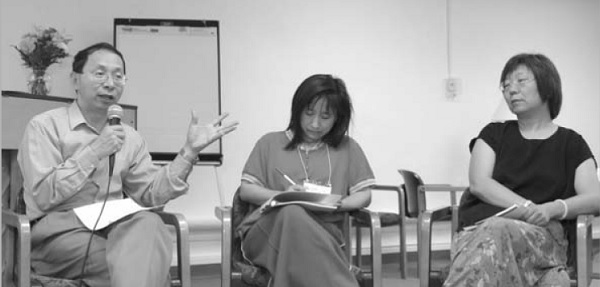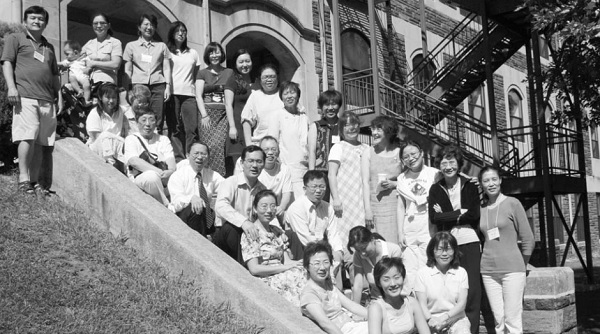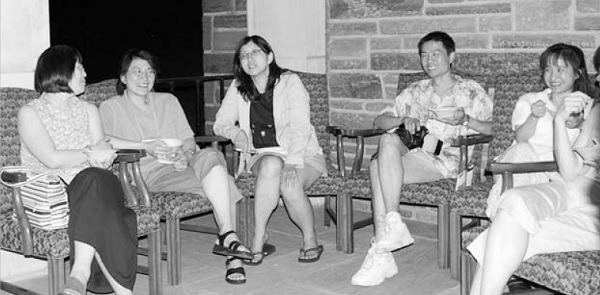Become a chef of the soul
W220 Writing Advanced and Editing Class Comprehensive Report

An editor is like a chef, constantly preparing spiritual food that is beneficial to readers' health, and like a quality control officer checking whether there are typos in the manuscript? Is the punctuation clear and correct? Are the scriptures quoted, names of people and times appearing in the text correct? Is it common sense to check the content? Common sense? Is the polished article tight and coherent? Are there unnecessary repetitions of words or redundant text? Does it fit the theme? Are the subtitles powerful? Can it arouse readers' interest? Then create a style, pay attention to whether the article content has both literary interest and interest, and has a balance between understandability, feasibility, approachability and readability? Another example is a preacher who conveys a vision through words without time and space limitations, arousing readers' resonance and action response.
Be a contributor
Because it was an advanced class, all students were participating in the writing camp again. Everyone felt like they were at home, which is something that cannot be found in other camps. It has both the feeling of vacation and the study of intensive courses; it has both physical and mental rest, spiritual release and broadened horizons. Every student has unlimited potential. This is a wonderful and vivid book. When people with high qualifications and intelligence come to the writing camp, they can be molded into elite soldiers of writing; those with average or mediocre qualifications can also have their inner potential discovered by teachers in the writing camp and become vessels that are in line with God's will.
During the opening ceremony of the editing class, camp director Gao Lili encouraged everyone by saying, "The eyes of the Lord run to and fro throughout the earth to show his power and help those whose hearts are honest toward Him." Heavenly Father wants us to use the gifts and talents we already have to glorify Him! He has a blueprint and a unique plan for each of us. Only through commitment coupled with gifts can His heart be satisfied. We need to be a Contributor, not just a Consumer. We are to be committed to Christ, to imitate His likeness as little Christs, to influence those around us, to be ministers of His grace, to be messengers of His love, to what He has entrusted to us. Learn from Joshua to trust God and take action by faith (refer to Joshua 1:10-11), "He who watches the wind will not sow, and he who watches the clouds will not reap" (refer to Ecclesiastes 11:4 ). Do not let our gifts be buried like silver in the ground. If you have a vision or are inspired, just do it! Actions speak louder than words.

▲Teacher Su Wen’an (first from left) demonstrates interviews with editors born in the literary camp.
Three fresh noodles? Dan dan noodles?
On the first night, three editing seniors: Jia Hua, Xian Dui and Hai Lan showed up and talked about editing with blood and tears. For someone who edits for the first time, it’s as if they came to Ice and Fire Island helplessly, feeling hot and cold and not knowing what to do. He also described being an editor as being the owner of a noodle shop: noodles with soybean paste, noodles with three delicacies, shredded pork noodles, and dandan noodles...you need to be able to "cover everything". Just be careful! careful! Be more careful! You must have patience, perseverance, and lead the team to go from "not knowing why" to "finally knowing why."
The principles learned from editing can also be applied to life to live a beautiful and powerful life. We must have a sense of mission. Our spiritual life and mission are like a pair of eagle wings, flying in the kingdom of God. Editors must have a keen mind, not be allergic, not criticize others, and establish good interpersonal relationships. Editors must also have the courage to break their own stereotypes.
By participating in the writing camp, you can not only meet new friends and build connections. If you have any questions when writing or editing, you can always ask the teachers for help and enjoy "lifelong after-sales service."

▲Teachers and students of the advanced writing and editing class and the art camp held at the same time gathered together and took photos amidst the picturesque scenery.
What material to choose? How to cook?
The role of the editor can be metaphorized using language and images; he is a chef (selecting materials and ingredients to make the most delicious food/article); he is a farmer (selecting seeds and working hard); he is a tailor (selecting fabrics and cutting them into suitable clothes). ); is a preacher (serving the church without walls); is a coach, gardener, carpenter, architect, teacher, conductor, restaurant owner...
The most important responsibilities of the editor are: to grasp the characteristics of the publication, pursue the quality of the editors and art editors, establish a service team, publish the publication on time, and control the editorial process.
Abilities that editors should strive to cultivate: internal strength and moves, spiritual power, endurance, insight, creativity, writing skills, interviewing skills, interpersonal management skills, planning skills, execution skills, and learning skills.
Editors should be "new, broad, and deep", be broad-minded in terms of thoughts and concepts, forgive their own past, step out of the box, and sincerely use the resources accumulated in the past as a reference. Only by thinking deeply and experiencing deeply can they impress others. Heartstrings. There are already so many books and periodicals, why do we need one more? What are the features, selling points and reason for existence of this publication? In addition to editing for manuscript submission, review, rejection, and revision, editors also perform planning, writing, interviewing, art editing, printing, distribution, finance, author cultivation, and reader interaction.

▲Students shared their thoughts before the end of the writing and editing class and the art camp, and they laughed and cried.
Apprenticeship at "Dae Jang Geum"
The editor is like the role of the chef and the medical woman in the Korean drama "Dae Jang Geum". She never gives up looking forward to the smiles in the hearts and faces of diners. With her sincere commitment to God and the influence she brings to people's lives, she will never present it to diners. Harmful food; those who submit food (authors, editors) must insist on preparing works and publications that are most beneficial to spiritual health.
An editor is like a spiritual chef who uses sincerity, creativity and time to prepare spiritually beneficial readings for readers. Teacher Su Wen'an's editing course uses the Korean drama "Dae Jang Geum" as a model teaching material, supplemented by Jin Yong's novels.
In an environment where the court was competing for power and profit, Jang Geum adhered to the principle of preparing the healthiest food for diners. Whether the other party was the emperor of Korea or the envoy of the Ming Dynasty, she considered them with sincerity, sweat and love. Editors and authors should also be considerate of their readers.
Because she was jealous of her achievements, her partners repeatedly excluded and suppressed her, but she stood up again in the trough and climbed over the high wall made of people. A seemingly weak and humble woman, but she hides endless wisdom and touching perseverance deep in her heart. She shows unique talent and influence in front of powerful and prominent people.
Jang Geum has a sincere heart that adheres to principles, is upright and honest, and the creativity that flows out of him is like a clear spring or the song of a bird, which is refreshing. "Dae Jang Geum" allows us to see the possibility of Christian literature ministry becoming a trend without sensationalism!
"Dae Jang Geum" also allows us to see our own responsibility in others' smallest needs! Sincerity is better than anything else. Creativity, sincerity and time are the secret recipe for success.
I want to make it up...why...
During the ten-minute free sketching session in the editorial practice class, Teacher Su asked the students to write down their editing dreams. The following is a collection of students’ answers:
I want to compile a report on global Christian ecology, because the five continents and the seven oceans are all part of the kingdom of God, and we need to care for the body of Christ.
I want to compile a short book and interview one hundred and one teenagers. Each person will describe his first and most unforgettable experience interacting with others, so that people can better understand the children of this generation.
I want to make up a love song, with lyrics full of love and gratitude, for my significant other.
I want to compile a column to encourage people to leave the world and turn to the kingdom of God. There are specific steps and routes, ministries, and connections to connect with.
I want to compile a children's publication that tells the story of children's innocent world and their learning and growth in games and fun.
I would like to compile a publication for the elderly that tells the story of the joys and sorrows of the elderly, as well as their struggles and struggles, so that the younger generation can learn from it.
I want to compile a camping newsletter. Through the nature created by God, without the interference of TV, computers and phones, the whole family can communicate as much as they want, work together, set up tents and burn campfires together (this publication can be used to share camping Information is the most economical and affordable way to travel and relax. Good campsites are available for fishing, hiking on mountain trails; horseback riding, jet ski boat, motorboat, tennis, and even golf...).
Based on Jin Yong’s novels
When I read Jin Yong's novels in the past, I was attracted by their gripping plots and lifelike characterizations. It was refreshing to hear Teacher Su analyze the characteristics and meanings of some characters. Speaking of the huge influence of Jin Yong’s novels, they can be used as a channel to communicate with evangelical friends. In the martial arts world outlined by Jin Yong, we can see the good and evil of human nature, the joys and sorrows of life, and then think more deeply about the meaning of life.
Teacher Su Wen'an said that Jin Yong's works have become the collective memory of the Chinese world. Since 1955, novels, movies, TV series, academic discussions, stage plays, songs, comics... have been integrated into the daily lives of three generations of Chinese at home and abroad. in life. The five major characteristics of martial arts novels are: Sinicization, literaryization of martial arts, attachment to history, equality between men and women, and virtual arena.
The five major characteristics of Jin Yong's martial arts novels: coffin-breaking, reimagined, exciting, borrowing from the past to illustrate the present, and creating a new realm for popular literature can all be used as inspiration for our writing.
Teacher Su also made in-depth missionary and religious associations with Jin Yong’s martial arts novels.
